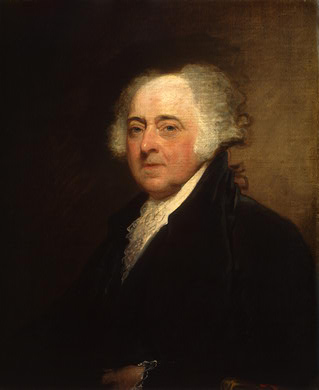Letter to Thomas Jefferson (17 January 1820). Often misquoted as "God is an essence that we know nothing of" and attached to a part of his 22 January 1825 letter to Thomas Jefferson.
1820s
John Adams: Citations en anglais
Concerning an interview in London with the ambassador from Tripoli, Sidi Haji Abdul Rahman Adja.
1780s, Letter to John Jay (1786)
1760s, A Dissertation on the Canon and Feudal Law (1765)
Letter to Josiah Quincy (9 February 1811), Quincy. http://oll.libertyfund.org/titles/adams-the-works-of-john-adams-vol-9-letters-and-state-papers-1799-1811
1810s
“If we do not lay out ourselves in the service of mankind whom should we serve?”
Abigail Adams, his wife, in a letter to John Thaxter (1778-09-29).
Misattributed
Presidential proclamation of a national day of fasting and prayer (6 March 1799)
1790s
Letter to Thomas Jefferson https://books.google.com/books?id=YoljDwAAQBAJ&pg=PT2942&lpg=PT2942&dq=%22While+all+other+Sciences+have+advanced,+that+of+Government+is+at+a+stand;+little+better+understood;+little+better+practiced+now+than+three+or+four+thousand+years+ago.%22&source=bl&ots=f42QS5YwAW&sig=nLqK0ZV3MRiT7r74EJm4ybMrLjo&hl=en&sa=X&ved=2ahUKEwjQn7T-po7eAhWvd98KHcD_CggQ6AEwA3oECAYQAQ#v=onepage&q=%22While%20all%20other%20Sciences%20have%20advanced%2C%20that%20of%20Government%20is%20at%20a%20stand%3B%20little%20better%20understood%3B%20little%20better%20practiced%20now%20than%20three%20or%20four%20thousand%20years%20ago.%22&f=false (9 July 1813)
1810s
Adams used this statement in a letter to Benjamin Waterhouse (21 May 1821), but he may have been quoting the poem "To Mr. Stuart, On his Portrait of Mrs. M" by Sarah Wentworth Apthorp Morton, first published in 1803:
: Genius is sorrow's child — to want allied —
Consoled by glory, and sustained by pride.
Misattributed
Source: 1780s, A Defence of the Constitutions of Government (1787), Ch. 1 Marchamont Nedham : The Right Constitution of a Commonwealth Examined"
1770s, Boston Massacre trial (1770)
In Adams' Argument for the Defense in the case of Rex v. Wemms: Suffolk Superior Court, Boston, 3-4 December, 1770; source "The Adams Papers", http://rotunda.upress.virginia.edu/
1770s
1760s, A Dissertation on the Canon and Feudal Law (1765)
1760s, A Dissertation on the Canon and Feudal Law (1765)
1760s, A Dissertation on the Canon and Feudal Law (1765)
1760s, A Dissertation on the Canon and Feudal Law (1765)
1760s, A Dissertation on the Canon and Feudal Law (1765)
1760s, A Dissertation on the Canon and Feudal Law (1765)
22 February 1756
1750s, Diaries (1750s-1790s)
Letter to Jonathan Sewall (October 1759)
1750s
1760s, A Dissertation on the Canon and Feudal Law (1765)
John Adams letter to John Taylor, Of Caroline, Quincy, (12 March, 1819)
1810s, Letter to John Taylor (1819)
